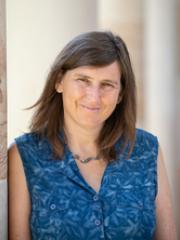Associate Professor Karin Borges

Dr Karin Borges heads the epilepsy and brain metabolism lab.
In addition, it is my mission to provide a research environment in my lab that is friendly and collaborative, where all lab members and collaborators thrive and can do brilliant research in epilepsy and other diseases (view the lab's policies). I am looking forward to working with many others on our new projects.
Researcher biography
At the age of 15 I thought that I would like to develop new treatments for diseases where there is a need. After studying Biology in Germany and while working as a post-doctoral fellow with Professor Raymond Dingledine at Emory University, I became passionate about epilepsy. When starting my own laboratory at Texas Tech University, I began to investigate impairments in energy metabolism in epilepsy and potential new treatments to address energetic deficiencies. In 2011, I moved to UQ and have since enjoyed the many opportunities working with many talented students and professionals and within the globally highly respected Australin epilepsy community.
Recent research:
Among many other projects, my lab has characterized several metabolic alterations and impairments in energy metabolism in epilepsy (1, 2) and Motor Neuron Disease (1). In brain areas that can generate seizures, cytosolic and mitochondrial metabolism of glucose is impaired (1), which can lead to energy deficits and may trigger seizures. From a biochemical standpoint, auxiliary fuels such as ketone bodies and medium chain fatty acids derived from medium chain triglyceride (MCTs) are well suited to improve energy levels. We have also shown that different MCTs, including triheptanoin, when added to normal diets can prevent seizure generation in seizure models (reviewed here 1, 2) and prevent motor neuron death in an MND model (1).
Our latest research aims to increase glucose transport into brain cells for glucose transporter 1 deficiency and epilepsy.
PhD and MPhil Supervision
- View current and completed supervisions on UQ Researchers.
Find out more information on how to apply for a Research Higher Degree (MPhil or PhD) with the School. For all enquiries regarding research supervision, please contact ask@uq.edu.au.
